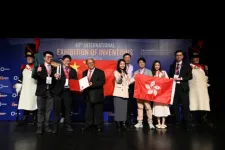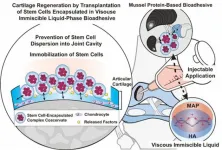(Press-News.org) PRESS RELEASE FROM THE UNIVERSITY OF CAMBRIDGE
EMBARGOED UNTIL: 01:00 BST / LONDON TIME WEDNESDAY 3 MAY 2023
Paper available at: https://drive.google.com/drive/folders/1GNT9-oVOFTREzjGTSGMK7nIUvlYR61PE?usp=sharing
Dogs may be at risk from high levels of lead from shotgun pellets in raw pheasant dog food, study finds
Researchers tested samples of raw pheasant dog food and discovered that the majority contained high levels of lead that could put dogs’ health at risk if they eat it frequently.
Lead is a toxic metal that negatively affects body systems of people and animals, with the nervous system being particularly sensitive. Although elevated levels of dietary lead are potentially damaging to animal health, lead shot can be legally used for hunting terrestrial gamebirds, like pheasants, in the UK. While most pheasants are eaten by people, some are used in petfood.
Cambridge researchers analysed 90 samples taken from three raw pheasant dog food products bought in the UK and found that 77% of samples had lead concentrations exceeding the maximum residue level (MRL) permitted in animal feed according to law. Mean lead concentrations of the three products were approximately 245, 135 and 49 times higher than the MRL.
The results are published today in the journal Ambio.
“We were already aware that lead concentrations in pheasant meat sold for human consumption are often far higher than would be permitted in other meats like chicken, beef or pork” said lead author Professor Debbie Pain of Cambridge’s Zoology Department. “However, we were surprised to find that lead concentrations in raw pheasant dog food products were so much higher”
The mean lead concentration in the raw pheasant dog food analysed was 34 times higher than that recently reported in pheasant meat sold for people to eat, which itself is considered to be too high. Researchers say this could be because raw pheasant meat is normally minced when used for dogfood whereas whole birds or pheasant breasts are generally sold for human consumption. Mincing may fragment lead shot, increasing the number of small lead particles in the meat and the potential for lead to be absorbed into the bloodstream.
The researchers say that dogs eating food with such high concentrations of lead, especially if they are fed on it frequently or as their main diet, are at risk of harm to their health. Puppies are particularly vulnerable both because young animals tend to absorb more of the lead they swallow than full-grown animals, and the developing nervous system is particularly affected by lead.
The scientists tested five pheasant-based dog food products. Three of these were raw meat products, one was a dried pheasant and partridge product, and one was a processed tinned pheasant and goose-based product. Three equivalent chicken-based petfood products (raw meat, dried and processed) were also assessed.
In addition to the raw pheasant dog food, levels of lead above the MRL were identified in some samples of the dried pheasant-based product, although the mean concentration was far lower than in the raw products. None of the samples from the chicken-based products or the tinned pheasant and goose-based product contained unacceptable levels of lead.
The popularity of raw meat diets for pets is increasing across the UK – a nation which is home to an estimated 13 million dogs and 12 million cats. The researchers found that raw dog food including pheasant meat was widely available in the UK. Raw pheasant pet food was sold by 34% of the 50 online raw pet food suppliers they checked – 71% of these stated that the meat may contain shot.
“The fact that most samples from three randomly sampled raw pheasant pet food products had very high lead concentrations, and that our recent research on shot types used to kill pheasants found that 94% are shot with lead, suggests that this is a far broader issue than for just these three products,” said co-author Professor Rhys Green. “However, some producers may source pheasants that have not been shot with lead, and owners could ask about this when buying pet food.”
The study of shot types in pheasants sold for human consumption is part of a body of research assessing the effectiveness of a voluntary ban in the UK on lead shotgun ammunition to shoot wild quarry, which is being phased in over a five-year period from February 2020. Nine major shooting organisations committed to this, for sustainability reasons, considering wildlife, the environment and also to ensure a market for the healthiest game products.
Cambridge scientists have consistently found compliance with the voluntary ban to be low, which is in line with other studies investigating other voluntary bans. However, a total ban in Denmark has been shown to be very effective.
A ban on the sale and use of lead gunshot, along with restrictions on lead bullets, is currently being considered under the UK REACH Chemicals Regulation.
The analytical costs of this research were funded by Wild Justice.
ENDS.
Reference:
D. Pain, R. E. Green, N. Bates, M. Guiu, M. A. Taggart, Lead concentrations in commercial dogfood containing pheasant in the UK, Ambio. DOI: 10.1007/s13280-023-01856-x
Contact details:
Charis Goodyear, University of Cambridge Charis.Goodyear@admin.cam.ac.uk
Debbie Pain, University of Cambridge paindebbie@gmail.com
About the University of Cambridge
The University of Cambridge is one of the world’s leading universities, with a rich history of radical thinking dating back to 1209. Its mission is to contribute to society through the pursuit of education, learning and research at the highest international levels of excellence.
Cambridge was second in the influential 2023 QS World University Rankings, the highest rated institution in the UK.
The University comprises 31 autonomous Colleges and over 100 departments, faculties and institutions. Its 20,000 students include around 9,000 international students from 147 countries. In 2022, 72.5% of its new undergraduate students were from state schools and more than 25% from economically disadvantaged backgrounds.
Cambridge research spans almost every discipline, from science, technology, engineering and medicine through to the arts, humanities and social sciences, with multi-disciplinary teams working to address major global challenges. In the Times Higher Education’s rankings based on the UK Research Excellence Framework, the University was rated as the highest scoring institution covering all the major disciplines.
The University sits at the heart of the ‘Cambridge cluster’, in which more than 5,200 knowledge-intensive firms employ more than 71,000 people and generate £19 billion in turnover. Cambridge has the highest number of patent applications per 100,000 residents in the UK.
www.cam.ac.uk
END
Dogs may be at risk from high levels of lead from shotgun pellets in raw pheasant dog food, study finds
Researchers tested samples of raw pheasant dog food and discovered that the majority contained high levels of lead that could put dogs’ health at risk if they eat it frequently.
2023-05-03
ELSE PRESS RELEASES FROM THIS DATE:
Why mosses are vital for the health of our soil and Earth
2023-05-03
Some people see moss growing in their gardens as a problem, but what they may not realise is this ancient ancestor of all plants is bringing lots of benefits to our green spaces, such as protecting against erosion.
Now a massive global study led by UNSW Sydney has found mosses are not just good for the garden, but are just as vital for the health of the entire planet when they grow on topsoil. Not only do they lay the foundations for plants to flourish in ecosystems around the world, they may play an important role mitigating against climate change by capturing ...
Hongkui Zeng elected to the National Academy of Sciences
2023-05-03
Hongkui Zeng, Ph.D., Executive Vice President and Director of the Allen Institute for Brain Science, a division of the Allen Institute, was today elected to the prestigious National Academy of Sciences for her work to understand the cells and connections in the mammalian brain, and leading the development of tools and openly available data resources that accelerate brain research worldwide.
“I am deeply honored to become a member of the National Academy of Sciences, joining more than 3,000 brilliant scientists around the country and the world,” said Zeng. “I feel incredibly fortunate to work at the Allen Institute alongside ...
Dementia and self-harm: why it's crucial to support patients in first year after diagnosis
2023-05-03
People diagnosed with dementia are more likely to self-harm within the first six to 12 months after initial diagnosis, highlighting the need for health services to offer more follow-up support in this crucial period.
In what is believed to be the largest study of its kind, researchers with expertise in medicine, psychiatry and psychology at UNSW Sydney looked at NSW hospital data captured for more than 180,000 people admitted to hospital between 2001 and 2015.
The researchers analysed statistics relating to two cohorts of patients admitted to hospital: 154,811 people recorded as having dementia, and ...
Boxing can take the fight to Parkinson’s Disease
2023-05-03
When we think of boxing, it’s understandable many of us wouldn’t associate it with being ‘good’ for our brains.
However, new Edith Cowan University (ECU) research undertaken in partnership with The Perron Institute and boxer Rai Fazio has shown the sport — without an opponent — could be a valuable way for people suffering Parkinson’s Disease (PD) to improve their quality of life.
Also collaborating with Sir Charles Gairdner Hospital and the University of Western Australia, ECU researchers had 10 people with early-stage PD perform three one-hour boxing sessions per week, over 15 weeks.
Rather ...
HKU’s innovative research novelties excel at 48th International Exhibition of Inventions of Geneva
2023-05-03
The University of Hong Kong (HKU) triumphed at the 48th International Exhibition of Inventions of Geneva, winning a total of 19 awards, including two special grand prizes Invention & Innovation CAI Award (China Delegation), and Prize of the Delegation of Malaysia. The results were announced yesterday (April 28).
Research teams from Faculty of Architecture, Faculty of Engineering, Faculty of Science, LKS Faculty of Medicine, and two HKU Inno Laboratories, established under the Hong Kong Government's InnoHK programme, garnered two special grand prizes, one Gold Medal with the Congratulations of the Jury, six Gold Medals, six Silver Medals ...
A novel stem cell adhesive using mussels
2023-05-03
Cartilage is a tissue that protects bones by providing shock absorption and facilitates smooth joint movement. Unfortunately, due to its limited intrinsic healing capacity, stem cell transplantation is a promising therapeutic approach to address cartilage inflammation and damage, as well as to promote cartilage regeneration. However, a major limitation of this technique is the rapid disappearance of transplanted stem cells from the smooth cartilage surface and fluidic environment around cartilage, resulting in less effective treatment outcomes. Recently, a joint team of researchers from POSTECH, Dongguk University Medical Center, and Nature Gluetech in Korea ...
Virginia Tech researchers study the crowdsourced investigation of Jan. 6, 2021
2023-05-03
How has online sleuthing successfully replaced wanted posters?
Researchers within the Virginia Tech Department of Computer Science answered this question by studying the crowdsourced online investigation that followed the Jan. 6, 2021, insurrection at the U.S. Capitol.
“These online communities can provide real value, if they’re organized in the right way,” said Kurt Luther, associate professor of computer science and history. “These aren’t just digital witch hunts now that make false identifications. They can really make solid contributions to ongoing investigations by getting images in front of people, which ...
Survey: Half of parents believe their children’s mental health suffered due to social media during the past year
2023-05-03
COLUMBUS, Ohio (May 3, 2023) — Concerns continue to grow about the impact social media use has on the mental health and well-being of children and adolescents. According to a new national survey conducted online by The Harris Poll on behalf of The On Our Sleeves Movement For Children’s Mental Health, half (50%) of parents of children younger than 18 feel their child(ren)’s mental health has suffered during the past 12 months because of social media use.
To best understand how social media is impacting their children’s mental health, On Our Sleeves encourages parents and caregivers to sit down and have ...
Engineers tap into good vibrations to power the Internet of Things
2023-05-03
In a world hungry for clean energy, engineers have created a new material that converts the simple mechanical vibrations all around us into electricity to power sensors in everything from pacemakers to spacecraft.
The first of its kind and the product of a decade of work by researchers at the University of Waterloo and the University of Toronto, the novel generating system is compact, reliable, low-cost and very, very green.
“Our breakthrough will have a significant social and economic impact by reducing our reliance on non-renewable power sources,” said Asif Khan, a ...
Texas A&M researcher receives $3M National Science Foundation manufacturing grant
2023-05-02
Dr. Zhijian “Z.J.” Pei and his intercollegiate team recently received the Future Manufacturing Research Grant from the National Science Foundation’s Future Manufacturing program, which funds researchers to develop new manufacturing capability that does not exist today. The focus of this research grant is to substitute products made from petroleum-based plastics or natural wood with biomass.
“Our idea is to use living matter, including fungi, algae, bacteria, plus agriculturally derived biomass and use 3D printing to make products,” said Pei, professor in the Wm Michael Barnes ’64 ...
LAST 30 PRESS RELEASES:
$3 million NIH grant funds national study of Medicare Advantage’s benefit expansion into social supports
Amplified Sciences achieves CAP accreditation for cutting-edge diagnostic lab
Fred Hutch announces 12 recipients of the annual Harold M. Weintraub Graduate Student Award
Native forest litter helps rebuild soil life in post-mining landscapes
Mountain soils in arid regions may emit more greenhouse gas as climate shifts, new study finds
Pairing biochar with other soil amendments could unlock stronger gains in soil health
Why do we get a skip in our step when we’re happy? Thank dopamine
UC Irvine scientists uncover cellular mechanism behind muscle repair
Platform to map living brain noninvasively takes next big step
Stress-testing the Cascadia Subduction Zone reveals variability that could impact how earthquakes spread
We may be underestimating the true carbon cost of northern wildfires
Blood test predicts which bladder cancer patients may safely skip surgery
Kennesaw State's Vijay Anand honored as National Academy of Inventors Senior Member
Recovery from whaling reveals the role of age in Humpback reproduction
Can the canny tick help prevent disease like MS and cancer?
Newcomer children show lower rates of emergency department use for non‑urgent conditions, study finds
Cognitive and neuropsychiatric function in former American football players
From trash to climate tech: rubber gloves find new life as carbon capturers materials
A step towards needed treatments for hantaviruses in new molecular map
Boys are more motivated, while girls are more compassionate?
Study identifies opposing roles for IL6 and IL6R in long-term mortality
AI accurately spots medical disorder from privacy-conscious hand images
Transient Pauli blocking for broadband ultrafast optical switching
Political polarization can spur CO2 emissions, stymie climate action
Researchers develop new strategy for improving inverted perovskite solar cells
Yes! The role of YAP and CTGF as potential therapeutic targets for preventing severe liver disease
Pancreatic cancer may begin hiding from the immune system earlier than we thought
Robotic wing inspired by nature delivers leap in underwater stability
A clinical reveals that aniridia causes a progressive loss of corneal sensitivity
Fossil amber reveals the secret lives of Cretaceous ants
[Press-News.org] Dogs may be at risk from high levels of lead from shotgun pellets in raw pheasant dog food, study findsResearchers tested samples of raw pheasant dog food and discovered that the majority contained high levels of lead that could put dogs’ health at risk if they eat it frequently.




